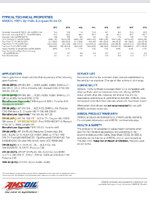- Joined
- Aug 25, 2023
- Messages
- 10
I’m trying to decide which is the best oil for my Audi Q7 requiring VW 502 oil. Based on my interpretation of the Amsoil data sheet attached, the EFM variant is the only one that has the actual VW 502 approval. The AFL version is “recommended for applications requiring VW 502” but doesn’t say it has the actual approval.
Can anyone shed some light on this? I know one is full SAPS and the other isn’t. I’m not sure what level of SAPS is most beneficial for my application (3.0T supercharged).
@Pablo can you chime in from Amsoil’s perspective?
I appreciate it!
For now I’m not considering other oils, I’ve always gone between Motul and Amsoil for my vehicles and I intend on staying in those two camps.
Can anyone shed some light on this? I know one is full SAPS and the other isn’t. I’m not sure what level of SAPS is most beneficial for my application (3.0T supercharged).
@Pablo can you chime in from Amsoil’s perspective?
I appreciate it!
For now I’m not considering other oils, I’ve always gone between Motul and Amsoil for my vehicles and I intend on staying in those two camps.

